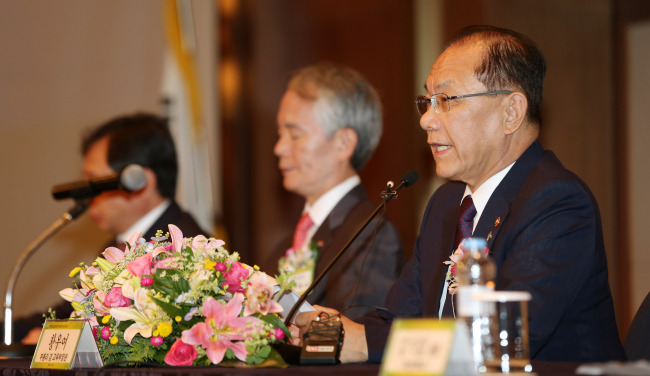South Korean universities will be allowed to adjust their student quotas for each department in partnership with nearby colleges, as part of efforts to boost expertise in higher education, the Education Ministry said last week.
The plan, in other words, would enable more flexible operations for each university that will allow them to concentrate on areas they are competent in, said the ministry at a seminar for university chiefs held by the Korean Council for University Education in Gyeongju, North Gyeongsang Province.
 |
Education Minister Hwang Woo-yea speaks during a seminar with university chiefs held by the Korean Council for University Education in Gyeongju, North Gyeongsang Province, Thursday. (Yonhap) |
For example, if a certain university has higher competency in its engineering department than another university, the two can reach an agreement so that the former will be allocated with larger student quota for the said department. The latter, in exchange, would get an increased quota for another department. The exchange would only occur within universities that are near each other.
The specifics for the plan, including the budget, will be announced sometime in July.
Education authorities compared the scheme to the mergers and acquisitions process.
“Each university can prioritize what they can do best and coordinate the number of students for each department accordingly,” said Lee Seung-bok, the director-general of the university support bureau at the ministry. This is part of the government’s Program for Industry Needs Matched Education (PRIME) project, which is to be implemented next year.
About 70.9 percent of high school graduates go on to receive tertiary education, according to a 2014 report by Statistics Korea. But the number of college graduates who are unemployed has consistently climbed since 2012, surpassing 500,000 for the first time this year.
According to the government, this is because higher education in Korea does not cater to what industry needs.
“The country needs to accurately calibrate the needs of the society and provide plans on meeting such needs,” said Education Minister Hwang Woo-yea. “The main thing is how to reduce the gap between what industry needs and what the universities’ provide.”
He said Korean education in the past has tried to “catch up” to developed countries, but now it needs to anticipate how the industry and the world will change in the decades to come.
According to the Labor Ministry, there is a shortage of approximately 31,000 natural sciences majors.
Han Seok-su, the head of the ministry’s university policy office, said natural sciences majors would be the focus of the student opening and department exchanges. He said the ministry was planning to provide subsidies ranging from 5 billion won ($4.5 million) to 20 billion won to each university participating in the PRIME project.
The university reforms based on employment have often led to disadvantages for students not majoring in basic sciences, particularly humanities majors who have struggled in the labor market in the past few years.
To prevent the number of humanities majors from plummeting, the ministry will encourage universities to provide additional scholarships for those who study humanities. The budget will come from 200 billion won in subsidies Hwang promised last month to provide financial support for humanities.
“The essence of the university is academics, the fruits of which can be reaped as late as a few decades later. I believe the country should be in charge of making sure that this is not neglected,” the minister said.
By Yoon Min-sik (
minsikyoon@heraldcorp.com)








